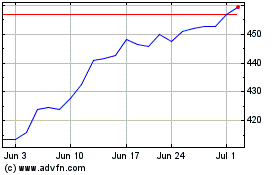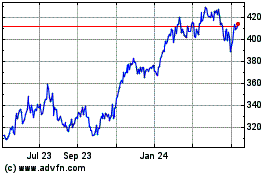Silicon Valley CEOs air concerns about Trump action's effect on
attracting foreigners
By Jack Nicas
Leaders from across the technology industry criticized President
Donald Trump's temporary ban on foreign nationals from seven
Muslim-majority countries, ending weeks of cautious engagement with
the new president, whom many in Silicon Valley opposed.
Alphabet Inc.'s Google, Apple Inc., Facebook Inc., Microsoft
Corp., Uber Technologies Inc. and other companies expressed concern
about the immigration order's effect on their employees, with some
executives saying the ban violated their personal and company
principles.
The ramifications of tighter immigration rules stretch from
finance to meat packing to construction. In Silicon Valley, which
relies on skilled foreigners to fill key roles, the order resonates
with prominent founders, executives and engineers, many of whom
were also foreign-born.
Microsoft Chief Executive Satya Nadella, who was born in India,
said the company will continue to be an advocate on the issue. "As
an immigrant and as a CEO, I've both experienced and seen the
positive impact that immigration has on our company, for the
country, and for the world," he said Saturday in an online
post.
Apple Chief Executive Tim Cook said in an email to employees
that his company has contacted the White House to explain the
"negative effect" the restrictions will have on workers. Mr. Cook,
who visited Washington last week, said he spoke to officials there
about Apple's belief "in the importance of immigration -- both to
our company and to our nation's future."
Mr. Trump on Friday signed an executive order that, for at least
90 days, bans people from seven nations -- Iran, Iraq, Libya,
Somalia, Sudan, Syria and Yemen -- from entering the U.S. The order
indefinitely bans Syrian refugees from the U.S. and suspends the
broader refugee program. Mr. Trump said the order was intended to
keep out "radical Islamic terrorists."
In an email to staff Friday, Google Chief Executive Sundar
Pichai said the new order affected at least 187 Google employees,
including one who had to rush back to the U.S. from overseas to
avoid being blocked from the country. Mr. Pichai asked any affected
employees abroad to contact the company's global security team.
"We're upset about the impact of this order and any proposals
that could impose restrictions on Googlers and their families, or
that could create barriers to bringing great talent to the U.S.,"
Mr. Pichai said in the email, a copy of which was reviewed by The
Wall Street Journal. "It's painful to see the personal cost of this
executive order on our colleagues."
A spokesman for venture capitalist Peter Thiel, Mr. Trump's
biggest supporter in the tech industry, said late Saturday that
"Peter doesn't support a religious test, and the administration has
not imposed one."
Google co-founder and president Sergey Brin, whose family
immigrated to the U.S. when he was 6 years old to avoid what he has
said was anti-Semitism before the fall of the Soviet Union, joined
a protest Saturday at San Francisco International Airport.
Mr. Brin took photos with protesters, including one with a baby
in a stroller that had a sign that read "I want my grandparents
back from Iran."
Facebook Chief Executive Mark Zuckerberg wrote on his Facebook
page Friday that he was "concerned" by the order. "We need to keep
this country safe, but we should do that by focusing on people who
actually pose a threat," he wrote.
Aaron Levie, chief executive of digital-storage firm Box Inc.,
said Mr. Trump's move is "totally infuriating" and "morally wrong."
He said he was investigating how to get involved personally to help
fight the order.
Beth Galetti, Amazon.com Inc.'s vice president of human
resources, sent an email to staff Saturday, recommending U.S.-based
employees from countries listed in the restrictions refrain from
traveling outside the U.S.
"As we've grown the company, we've worked hard to attract
talented people from all over the world," Ms. Galetti said in her
email.
International Business Machines Corp. declined to comment.
Oracle Corp. didn't respond to a request for comment.
The tech industry relies on skilled foreigners to create new
startups and fill engineering roles. Foreigners founded more than
half of U.S. startups valued at more than $1 billion, according to
a recent study by the National Foundation for American Policy, a
nonpartisan think tank focused on immigration issues.
The tech industry is also lobbying in Washington regarding
expected changes to the work-visa programs for skilled foreigners,
which Silicon Valley is dependent on for employees. For instance,
77% of full-time graduate students in electrical engineering and
71% in computer science at U.S. universities are international
students, said Stuart Anderson, head of the National Foundation for
American Policy.
In fiscal 2013, the U.S. issued nearly 274,000 skilled-worker
visas, known as H-1B visas. Citizens from the banned countries
received 1,220 of those visas, including 810 to Iranians, 280 to
Syrians and 53 to Libyans, according to government data compiled by
Ron Hira, a Howard University political-science professor who
tracks immigration trends. The 2013 data is the most recent
complete data Mr. Hira analyzed.
Many tech executives were guarded following Mr. Trump's
election, and even tried courting his administration in recent
weeks, despite their opposition to him during the campaign. Shortly
after the election, executives from across Silicon Valley met with
Mr. Trump in New York to discuss issues pertinent to the
industry.
Several executives, including Tesla Motors Inc. Chief Executive
Elon Musk, IBM Chief Executive Ginni Rometty and Uber Chief
Executive Travis Kalanick, are serving on groups advising the Trump
administration.
--Rolfe Winkler, Tripp Mickle and
Jay Greene
contributed to this article.
Write to Jack Nicas at jack.nicas@wsj.com
(END) Dow Jones Newswires
January 30, 2017 02:47 ET (07:47 GMT)
Copyright (c) 2017 Dow Jones & Company, Inc.
Microsoft (NASDAQ:MSFT)
Historical Stock Chart
From Mar 2024 to Apr 2024

Microsoft (NASDAQ:MSFT)
Historical Stock Chart
From Apr 2023 to Apr 2024
